Feldene (Piroxicam) is used to relieve some symptoms caused by rheumatoid arthritis, osteoarthritis (arthrosis, degenerative joint disease) and ankylosing spondylitis (rheumatism of the spine) such as swelling, stiffness and joint pain.

Why have I been prescribed Feldene?
- Feldene (Piroxicam) is used to relieve some symptoms caused by rheumatoid arthritis, osteoarthritis (arthrosis, degenerative joint disease) and ankylosing spondylitis (rheumatism of the spine) such as swelling, stiffness and joint pain. Feldene does not cure arthritis and will help you only as long as you continue to take it.
- Your doctor will prescribe piroxicam to you only when you have had unsatisfactory relief of symptoms with other non-steroidal anti-inflammatory medicines (NSAIDs).
How does it work?
Piroxicam is one of a group of medicines called non-steroidal anti-inflammatory drugs (NSAIDs). This means it will help to relieve pain and reduce swelling affecting joints and muscles by blocking the production of chemicals that cause pain and inflammation.
When and how do I take it?
- Swallow your capsules with a glass of water.
- It is best to take your capsules at the same time each day and with food.
What’s the dose?
- The maximum daily dose is 20 milligrams of piroxicam as one single daily dose.
- If you are older than 70 years your doctor may prescribe a lower daily dose and reduce the duration of treatment.
- Your doctor may prescribe piroxicam with another medicine to protect your stomach and intestine for potential side effects.
Could it interact with other tablets?
Tell your doctor about any other medicines you are taking or took recently (in the last week) – even medicines you bought yourself without a prescription. Medicines can sometimes interfere with each other. Your doctor may limit your use of piroxicam or other medicines, or you may need to take a different medicine. It’s especially important to mention if you are taking:
- anticoagulants such as warfarin to prevent blood clots
- aspirin or other non-steroidal anti-inflammatory drugs for pain relief
- lithium to treat depression
- diuretics such as hydrochlorothiazide to treat high blood pressure or kidney problems
- anti-hypertensives such as atenolol (a beta-blocker) or clonidine to treat high blood pressure
- cardiac glycosides such as digoxin to treat heart conditions
- methotrexate to treat various conditions including types of cancer
- ciclosporin to prevent the rejection of organs following transplants
- corticosteroids such as cortisone to treat various hormone related conditions or for allergic disorders
- aminoglycoside antibiotics such as streptomycin which are given to treat some types of infection
- probenecid to treat gout
- sulfonylurea drugs such as chlorpropamide to treat diabetes
- serotonin selective reuptake inhibitors (SSRIs) to treat depression
- anti-platelet medicines such as aspirin
If any of these applies to you, tell your doctor immediately.
Herbal products should also only be taken after talking with your doctor.
What are the possible risks or side-effects?
Feldene may cause undesirable effects, the most common of which are related to the digestive system. These generally do not cause a problem, however, if any of them are severe you should contact your doctor immediately.
Commonly reported undesirable effects that Feldene may cause are:
- nausea
- vomiting
- diarrhoea
- constipation
- wind
- indigestion
- abdominal pain/discomfort
- mouth ulcers
- loss of appetite
- peptic (e.g. stomach) ulcers
- inflammation of the stomach lining (gastritis), and worsening of symptoms associated with colitis and Crohn’s disease
Since there have been reports of gastro-intestinal bleeding with Feldene it is important that vomiting of blood, and/or black or bloodstained bowel movements are reported to your doctor immediately.
Can I drink alcohol while taking it?
- There are no known interactions between alcohol and Feldene
- Always ask you doctor or pharmacist however as other medications you are taking may have a bearing on this.
What if I’m pregnant/breastfeeding?
You should talk to your doctor before using Feldene if you are pregnant. It is not recommended while pregnant.
Feldene is not recommended during breast feeding.
If you have any more questions please ask your Pharmacist.
Remember to keep all medicines out of reach of children
Please Note: We have made every effort to ensure that the content of this information sheet is correct at time of publish, but remember that information about drugs may change. This sheet does not list all the uses and side-effects associated with this drug. For full details please see the drug information leaflet which comes with your medicine. Your doctor will assess your medical circumstances and draw your attention to any information or side-effects which may be relevant in your particular case.
References:
http://www.medicinenet.com/piroxicam/article.htm
http://www.rxlist.com/feldene-drug.htm
http://www.drugs.com/cdi/feldene.html
https://www.medicines.org.uk/emc/medicine/27267

